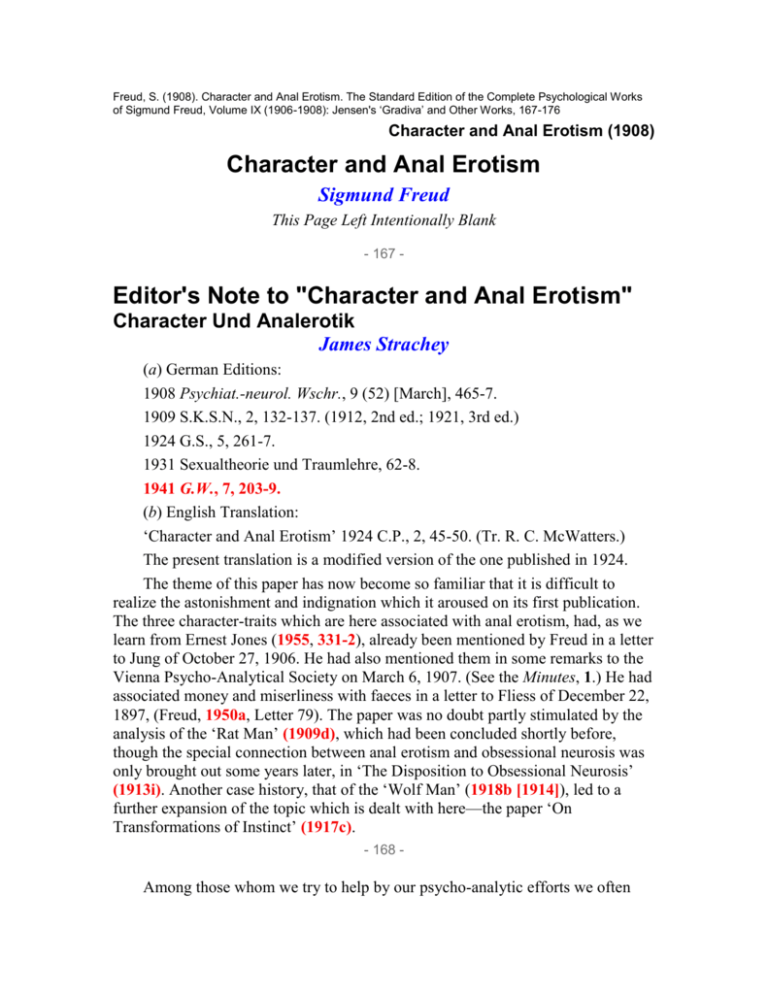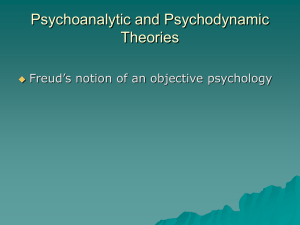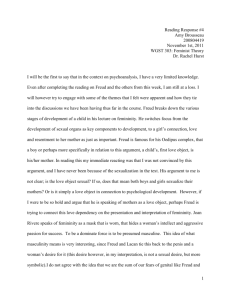This Page Left Intentionally Blank
advertisement

Freud, S. (1908). Character and Anal Erotism. The Standard Edition of the Complete Psychological Works of Sigmund Freud, Volume IX (1906-1908): Jensen's ‘Gradiva’ and Other Works, 167-176 Character and Anal Erotism (1908) Character and Anal Erotism Sigmund Freud This Page Left Intentionally Blank - 167 - Editor's Note to "Character and Anal Erotism" Character Und Analerotik James Strachey (a) German Editions: 1908 Psychiat.-neurol. Wschr., 9 (52) [March], 465-7. 1909 S.K.S.N., 2, 132-137. (1912, 2nd ed.; 1921, 3rd ed.) 1924 G.S., 5, 261-7. 1931 Sexualtheorie und Traumlehre, 62-8. 1941 G.W., 7, 203-9. (b) English Translation: ‘Character and Anal Erotism’ 1924 C.P., 2, 45-50. (Tr. R. C. McWatters.) The present translation is a modified version of the one published in 1924. The theme of this paper has now become so familiar that it is difficult to realize the astonishment and indignation which it aroused on its first publication. The three character-traits which are here associated with anal erotism, had, as we learn from Ernest Jones (1955, 331-2), already been mentioned by Freud in a letter to Jung of October 27, 1906. He had also mentioned them in some remarks to the Vienna Psycho-Analytical Society on March 6, 1907. (See the Minutes, 1.) He had associated money and miserliness with faeces in a letter to Fliess of December 22, 1897, (Freud, 1950a, Letter 79). The paper was no doubt partly stimulated by the analysis of the ‘Rat Man’ (1909d), which had been concluded shortly before, though the special connection between anal erotism and obsessional neurosis was only brought out some years later, in ‘The Disposition to Obsessional Neurosis’ (1913i). Another case history, that of the ‘Wolf Man’ (1918b [1914]), led to a further expansion of the topic which is dealt with here—the paper ‘On Transformations of Instinct’ (1917c). - 168 - Among those whom we try to help by our psycho-analytic efforts we often come across a type of person who is marked by the possession of a certain set of character-traits, while at the same time our attention is drawn to the behaviour in his childhood of one of his bodily functions and the organ concerned in it. I cannot say at this date what particular occasions began to give me an impression that there was some organic connection between this type of character and this behaviour of an organ, but I can assure the reader that no theoretical expectation played any part in that impression. Accumulated experience has so much strengthened my belief in the existence of such a connection that I am venturing to make it the subject of a communication. The people I am about to describe are noteworthy for a regular combination of the three following characteristics. They are especially orderly, parsimonious and obstinate. Each of these words actually covers a small group or series of interrelated character-traits. ‘Orderly’1 covers the notion of bodily cleanliness, as well as of conscientiousness in carrying out small duties and trustworthiness. Its opposite would be ‘untidy’ and ‘neglectful’. Parsimony may appear in the exaggerated form of avarice; and obstinacy can go over into defiance, to which rage and revengefulness are easily joined. The two latter qualities—parsimony and obstinacy— are linked with each other more closely than they are with the first— with orderliness. They arc, also, the more constant element of the whole complex. Yet it seems to me incontestable that all three in some way belong together. ————————————— [PEP] This page can be read in German in GESAMMELTE WERKE Vol 7, Page 203 1 [‘Ordentlich’ in German. The original meaning of the word is ‘orderly’; but it has become greatly extended in use. It can be the equivalent of such English terms as ‘correct’, ‘tidy’, ‘cleanly’, ‘trustworthy’, as well as ‘regular’, ‘decent’ and ‘proper’, in the more colloquial senses of those words.] - 169 - It is easy to gather from these people's early childhood history that they took a comparatively long time to overcome their infantile incontinentia alvi [faecal incontinence], and that even in later childhood they suffered from isolated failures of this function. As infants, they seem to have belonged to the class who refuse to empty their bowels when they are put on the pot because they derive a subsidiary pleasure from defaecating;1 for they tell us that even in somewhat later years they enjoyed holding back their stool, and they remember—though more readily about their brothers and sisters than about themselves—doing all sorts of unseemly things with the faeces that had been passed. From these indications we infer that such people are born with a sexual constitution in which the erotogenicity of the anal zone is exceptionally strong. But since none of these weaknesses and idiosyncracies are to be found in them once their childhood has been passed, we must conclude that the anal zone had lost its erotogenic significance in the course of development; and it is to be suspected that the regularity with which this triad of properties is present in their character may be brought into relation with the disappearance of their anal erotism. I know that no one is prepared to believe in a state of things so long as it appears to be unintelligible and to offer no angle from which an explanation can be attempted. But we can at least bring the underlying factors nearer to our understanding by the help of the postulates I laid down in my Three Essays on the Theory of Sexuality in 1905.2 I there attempted to show that the sexual instinct of man is highly complex and is put together from contributions made by numerous constituents and component instincts. Important contributions to ‘sexual excitation’ are furnished by the peripheral excitations of certain specially designated parts of the body ————————————— [PEP] This page can be read in German in GESAMMELTE WERKE Vol 7, Page 204 1 Cf. Freud, Three Essays on the Theory of Sexuality (1905d), Standard Ed., 7, 186. 2 2[The material in the present paragraph is derived mainly from Section 5 of the first essay and Section 1 of the second (Standard Ed., 7, 167 ff. and 176 ff.)] - 170 - (the genitals, mouth, anus, urethra), which therefore deserve to be described as ‘erotogenic zones’. But the amounts of excitation coming in from these parts of the body do not all undergo the same vicissitudes, nor is the fate of all of them the same at every period of life. Generally speaking, only a part of them is made use of in sexual life; another part is deflected from sexual aims and directed towards others—a process which deserves the name of ‘sublimation’. During the period of life which may be called the period of ‘sexual latency’—i.e. from the completion of the fifth year1 to the first manifestations of puberty (round about the eleventh year)—reaction-formations, or counter-forces, such as shame, disgust and morality, are created in the mind. They are actually formed at the expense of the excitations proceeding from the erotogenic zones, and they rise like dams to oppose the later activity of the sexual instincts. Now anal erotism is one of the components of the [sexual] instinct which, in the course of development and in accordance with the education demanded by our present civilization, have become unserviceable for sexual aims. It is therefore plausible to suppose that these character-traits of orderliness, parsimony and obstinacy, which are so often prominent in people who were formerly anal erotics, are to be regarded as the first and most constant results of the sublimation of anal erotism.2 ————————————— [PEP] This page can be read in German in GESAMMELTE WERKE Vol 7, Page 205 1 [In the German editions before 1924 this read ‘from the completion of the fourth year’.] 2 Since it is precisely the remarks in my Three Essays on the Theory of Sexuality about the anal erotism of infants that have particularly scandalized uncomprehending readers, I venture at this point to interpolate an observation for which I have to thank a very intelligent patient. ‘A friend of mine’, he told me, ‘who has read your Three Essays on the Theory of Sexuality, was talking about the book. He entirely agreed with it, but there was one passage, which—though of course he accepted and understood its meaning like that of the rest —struck him as so grotesque and comic that he sat down and laughed over it for a quarter of an hour. This passage ran: “One of the clearest signs of subsequent eccentricity or nervousness is to be seen when a baby obstinately refuses to empty his bowels when he is put on the pot—that is, when his nurse wants him to—and holds back that function till he himself chooses to exercise it. He is naturally not concerned with dirtying the bed, he is only anxious not to miss the subsidiary pleasure attached to defaecating.” [Standard Ed., 7, 186.] The picture of this baby sitting on the pot and deliberating whether he would put up with a restriction of this kind upon his personal freedom of will, and feeling anxious, too, not to miss the pleasure attached to defaecating,—this caused my friend the most intense amusement. About twenty minutes afterwards, as we were having some cocoa, he suddenly remarked without any preliminary: “I say, seeing the cocoa in front of me has suddenly made me think of an idea that I always had when I was a child. I used always to pretend to myself that I was the cocoa-manufacturer Van Houten” (he pronounced the name Van “Hauten” [i.e. with the first syllable rhyming with the English word ‘cow’]) “and that I possessed a great secret for the manufacture of this cocoa. Everybody was trying to get hold of this secret that was a boon to humanity but I kept it carefully to myself. I don't know why I should have hit specially upon Van Houten. Probably his advertisements impressed me more than any others.” Laughing, and without thinking at the time that my words had any deep meaning, I said: “Wann haut'n die Mutter?” [‘When does mother smack?’ The first two words in the German phrase are pronounced exactly like ‘Van Houten’.] It was only later that I realized that my pun in fact contained the key to the whole of my friend's sudden childhood recollection, and I then recognized it as a brilliant example of a screenphantasy. My friend's phantasy, while keeping to the situation actually involved (the nutritional process) and making use of phonetic associations (“Kakao” [‘cocoa’.—‘Kaka’ is the common German nursery word for ‘faeces’—cf. a dream at the end of Section IX of Freud, 1923c] and “Wann haut'n”), pacified his sense of guilt by making a complete reversal in the content of his recollection: there was a displacement from the back of the body to the front, excreting food became taking food in, and something that was shameful and had to be concealed became a secret that was a boon to humanity. I was interested to see how, only a quarter of an hour after my friend had fended the phantasy off (though, it is true, in the comparatively mild form of raising an objection on formal grounds), he was, quite involuntarily, presented with the most convincing evidence by his own unconscious.’ - 171 - The intrinsic necessity for this connection is not clear, of course, even to myself. But I can make some suggestions which may help towards an understanding of it. Cleanliness, orderliness and trustworthiness give exactly the impression of a reaction-formation against an interest in what is unclean and disturbing and should not be part of the body. (‘Dirt is ————————————— [PEP] This page can be read in German in GESAMMELTE WERKE Vol 7, Page 205 - 172 - matter in the wrong place.’)1 To relate obstinacy to an interest in defaecation would seem no easy task; but it should be remembered that even babies can show self-will about parting with their stool, as we have seen above [p. 170], and that it is a general practice in children's upbringing to administer painful stimuli to the skin of the buttocks— which is linked up with the erotogenic anal zone—in order to break their obstinacy and make them submissive. An invitation to a caress of the anal zone is still used to-day, as it was in ancient times, to express defiance or defiant scorn, and thus in reality signifies an act of tenderness that has been overtaken by repression. An exposure of the buttocks represents a softening down of this spoken invitation into a gesture; in Goethe's Götz von Berlichingen both words and gesture are introduced at the most appropriate point as an expression of defiance.2 The connections between the complexes of interest in money and of defaecation, which seem so dissimilar, appear to be the most extensive of all. Every doctor who has practised psycho-analysis knows that the most refractory and long-standing cases of what is described as habitual constipation in neurotics can be cured by that form of treatment. This is less surprising if we remember that that function has shown itself similarly amenable to hypnotic suggestion. But in psycho-analysis one only achieves this result if one deals with the patients’ money complex and induces them to bring it into consciousness with all its connections. It might be supposed that the neurosis is here only following an indication of common usage in speech, which calls a person who keeps too careful a hold on his money ‘dirty’ or ‘filthy’3 But ————————————— [PEP] This page can be read in German in GESAMMELTE WERKE Vol 7, Page 206 1 [This sentence is in English in the original.] 2 [The scene occurs in Act III, when Götz is summoned by a Herald to surrender. In the later acting version of the play the words are toned down.] 3 [The English ‘filthy’ as well as the German ‘Jilzig’ appears in the original. Freud had already commented on the usage mentioned here, in a letter to Fliess of December 22, 1897 (Freud, 1950a, Letter 79) and, later, in the first edition of The Interpretation of Dreams (1900a), Standard Ed., 4, 200.] - 173 - this explanation would be far too superficial. In reality, wherever archaic modes of thought have predominated or persist—in the ancient civilizations, in myths, fairy tales and superstitions, in unconscious thinking, in dreams and in neuroses— money is brought into the most intimate relationship with dirt. We know that the gold which the devil gives his paramours turns into excrement after his departure, and the devil is certainly nothing else than the personification of the repressed unconscious instinctual life.1 We also know about the superstition which connects the finding of treasure with defaecation,2 and everyone is familiar with the figure of the ‘shitter of ducats [Dukatenscheisser]’.3 Indeed, even according to ancient Babylonian doctrine gold is ‘the faeces of Hell’ (Mammon = ilu manman4). Thus in following the usage of language, neurosis, here as elsewhere, is taking words in their original, significant sense, and where it appears to be using a word figuratively it is usually simply restoring its old meaning.5 It is possible that the contrast between the most precious substance known to men and the most worthless, which they reject as waste matter (‘refuse’6), has led to this specific identification of gold with faeces. Yet another circumstance facilitates this equation in ————————————— [PEP] This page can be read in German in GESAMMELTE WERKE Vol 7, Page 207 1 Compare hysterical possession and demoniac epidemics. [Freud discussed this at considerable length in Part III of his paper ‘A Seventeenth Century Demonological Neurosis’ (1923d). The legendary transformation of witches’ gold into faeces and the comparison with the ‘Dukatenscheisser’ below had already been mentioned by Freud in a letter to Fliess of January 24, 1897 (1950a, Letter 57).] 2 [Numerous examples of this derived from folklore are given in Freud and Oppenheim's paper on ‘Dreams in Folklore’ (1957a [1911]), Standard Ed., 12, 187 ff.] 3 [A term vulgarly used for a wealthy spendthrift.] 4 Cf. Jeremias (1904, 115 n.) and Babylonisches im Alten Testament (1906, 96). ‘“Mamon” (“Mammon”) is “Manman” in Babylonian and is another name for Nergal, the God of the Underworld. According to Oriental mythology, which has passed over into popular legends and fairy tales, gold is the excrement of Hell.’ Monotheistische Strömungen innerhalb der babylonischen Religion, p. 16 n. 1. 5 [For the occurrence of this in dreams, see a passage added in 1909 to The Interpretation of Dreams, Standard Ed., 5, 407.] 6 [In English in the original.] - 174 - neurotic thought. The original erotic interest in dcfaecation is, as we know, destined to be extinguished in later years. In those years the interest in money makes its appearance as a new interest which had been absent in childhood. This makes it easier for the earlier impulsion, which is in process of losing its aim, to be carried over to the newly emerging aim. If there is any basis in fact for the relation posited here between anal erotism and this triad of character-traits, one may expect to find no very marked degree of ‘anal character’ in people who have retained the anal zone's erotogenic character in adult life, as happens, for instance, with certain homosexuals. Unless I am much mistaken, the evidence of experience tallies quite well on the whole with this inference. We ought in general to consider whether other character-complexes, too, do not exhibit a connection with the excitations of particular erotogenic zones. At present I only know of the intense ‘burning’ ambition of people who earlier suffered from enuresis.l We can at any rate lay down a formula for the way in which character in its final shape is formed out of the constituent instincts: the permanent character-traits are either unchanged prolongations of the original instincts, or sublimations of those instincts, or reaction-formations against them.2 ————————————— [PEP] This page can be read in German in GESAMMELTE WERKE Vol 7, Page 208 1 [The connection between urethral erotism and ambition seems to find its first mention here. Freud occasionally returned to the point, e.g. in a sentence added in 1914 to The Interpretation of Dreams, Standard Ed., 4, 216 and in a footnote added in 1920 to the Three Essays (1905d), Standard Ed., 7, 239. In a long footnote to Section III of Civilization and its Discontents (1930a) he brought the present finding into connection with his two other main lines of thought concerning enuresis—its symbolic association with fire and its importance as an infantile equivalent of masturbation. Sec also the still later paper on ‘The Acquisition and Control of Fire’ (1932a).] 2 [There are not many accounts by Freud of the nature of ‘character’ and the mechanism of its formation. Among them may be mentioned a passage near the end of the Three Essays (1905d), Standard Ed., 7, 238-9, some remarks in the paper on ‘The Disposition to Obsessional Neurosis’ (1913i), Standard Ed., 12, 323-4, and especially a discussion in the first half of Chapter III of The Ego and the Id (1923b), the gist of which is repeated in Lecture XXXII of the New Introductory Lectures (1933a).] - 175 - This Page Left Intentionally Blank - 176 - Article Citation [Who Cited This?] Freud, S. (1908). Character and Anal Erotism. The Standard Edition of the Complete Psychological Works of Sigmund Freud, Volume IX (1906-1908): Jensen's ‘Gradiva’ and Other Works, 167-176






